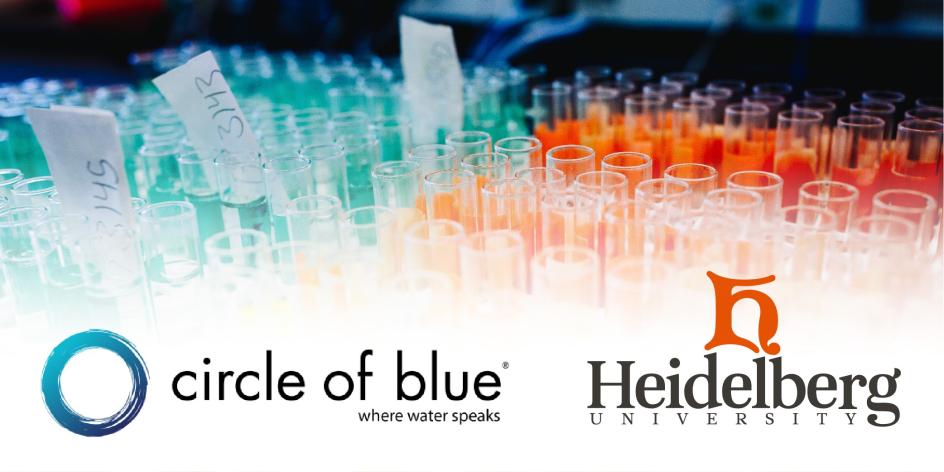
Heidelberg University and its National Center for Water Quality Research (NCWQR) today announced a new partnership with Circle of Blue, the international news organization informing the world’s important decisions about water, food, and energy in a changing climate.
The partnership is designed to produce expanded educational opportunities, innovative research initiatives, and scientific communication at a time when compounding water challenges are threatening the ability to grow food, generate energy, and support cities and ecosystems.
“Improving the sustainability of our freshwater resources is crucial at this moment,” said Dr. Laura Johnson, director of the NCWQR. “We are on the cusp of major changes to water availability associated with inefficiency and the impacts of climate. This partnership represents a unique opportunity to enhance the management of a critical resource while simultaneously training a new generation of thinkers to help solve these issues.”
“Water has defined the success or failure of civilizations,” said J. Carl Ganter, managing director of Circle of Blue. “By combining trusted journalism, research, education, and convening the brightest minds, we can accelerate collaborative and systemic solutions that define a bright water future for our own communities and the world."
The partnership will also help accelerate the exploration and development of the Global Water Center for Education, Research, and Commercialization, a priority in Heidelberg’s newly approved Strategic Action Growth Plan 2022-2026.
“This comes at a rare moment in history when we can foster a powerful curiosity aimed to tackle some of the world’s largest challenges,” said Heidelberg President Rob Huntington. “The future of our economies and environment will be defined by water, and the future of all societies will be defined by education and rapid innovation to secure our global water and environment.”
The new partnership is designed to catalyze a wider scope of internationally significant water research at Heidelberg and unique educational opportunities through the Global Water Center. “Circle of Blue is an ideal partner, bringing its expertise in front-line reporting, diverse audiences, and solutions networks,” Johnson said.
For nearly two decades, Circle of Blue's distinctive approach — uniting trusted journalism, science, data, design, and the practice of convening experts, decision-makers, and the public — has informed substantive changes in water policy and practices within governments, institutions, and businesses.
Circle of Blue’s model of stout reporting and cumulative feedback, for instance, informed China’s shift in policy in 2012 that conserved water and increased renewable energy production. The work attracted the attention of the Rockefeller Foundation, which honored Circle of Blue with its Centennial Innovation Award. Circle of Blue also has been recognized for its path-breaking work by the American Academy of Arts and Sciences, the World Economic Forum, the Vatican, and the White House, among others. Its multi-disciplinary work, convenings, and collaborations reach across the Great Lakes, U.S., China, Australia, Mexico, India, and the Middle East.
For more than 170 years, Heidelberg University has supported an educational model that prepares its students to lead purposeful and distinctive lives through innovation in the liberal arts, professional education, systems-based learning, diversity, and creative exploration. The NCWQR is one of the world’s most recognized water research centers.
Since its founding in 1969, the NCWQR is widely known for research on factors that influence the water quality of streams, rivers, and lakes in Ohio and the Midwest. The NCWQR’s mission is to generate knowledge about the dynamics of water and soil resources in order to improve water quality and availability. The ultimate vision of the NCWQR is a world where scientific research informs the sustainable use of water and soils thereby preserving these resources for future generations.